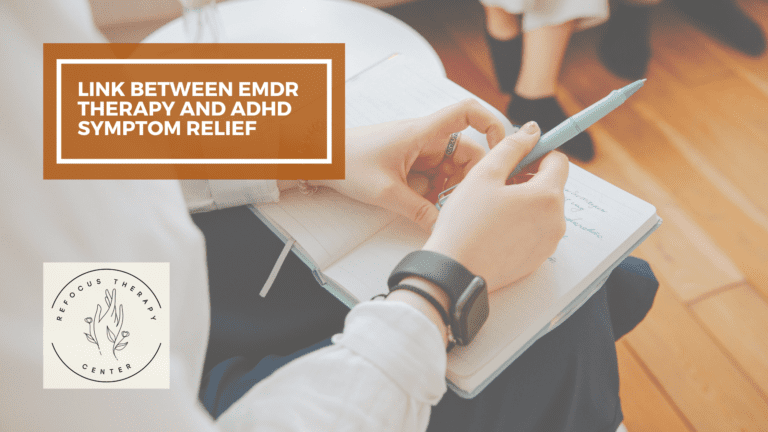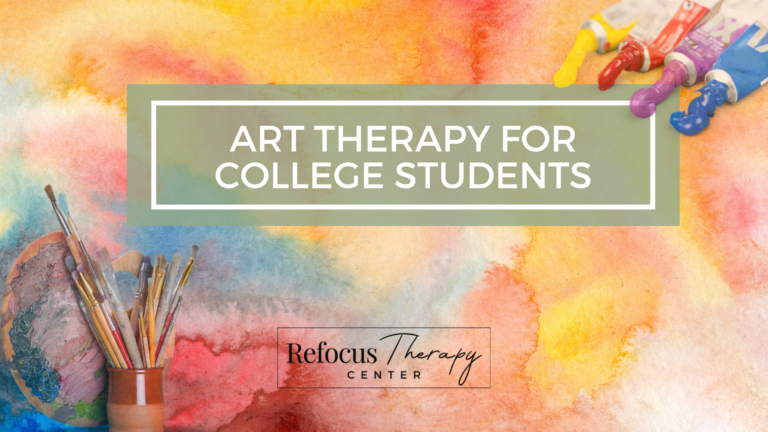Attention-Deficit Hyperactivity Disorder (ADHD) can be challenging for those who experience it. Symptoms include difficulties with attention, impulsivity, and mood swings. While the standard treatments are prescription medication and behavioral therapy, researchers have been studying other effective therapeutic approaches that might also prove helpful.
One such treatment is called Eye Movement Desensitization and Reprocessing, or EMDR. This blog looks deeper into the connection between the ADHD condition and EMDR treatment and determines whether EMDR actually helps with ADHD.
What is EMDR?
EMDR was originally designed to help individuals treat traumatic experiences. The method is guided by leading a patient through memories of the trauma while engaging them in the form of bilateral stimulation-most often guided eye movements. This aids the brain in better processing distressing memories and enhances coping skills with less emotional distress.
Although primarily used for PTSD, many people who have ADHD have found EMDR techniques helpful in dealing with their conditions. EMDR fills some of the gaps that may exist between the emotional and cognitive compartments that are causing problems for some ADHD patients.
Connection between EMDR and ADHD
ADHD is not just an attention disorder. More often than not, it goes hand in hand with emotional dysregulation, impulsive behavior, or even overreaction to stressors. Such conditions are often sparked by historical traumatic experiences or chronic stress. This is precisely when EMDR therapy could be of use.
Processing previous traumata:
Most of these ADHD patients have experienced previous adverse events—bullying at school, family problems, or neglect. EMDR is helpful for such patients’ processing of the memories in the sense that emotional charges attached to these are low, and they will feel more in control. Once the client has processed past trauma, cases of anxiety and impulsivity lessen, and the focus becomes easier.
Reducing Anxiety and Emotional Dysregulation:
People with ADHD tend to face emotional dysregulation, a much greater challenge than others. They get overwhelmed by their emotions and react impulsively. EMDR quiets down the nervous system and rewires the responses to stress and emotionality.
Improved Concentration and Attention:
Several studies suggest that EMDR therapy improves concentration ability. With regard to mental clarity, when traumatic memories involving both emotional pain and traumatic elements are processed, individuals feel clearer in their heads. That clarity might translate into the ability to hold attention over some time and improve one’s executive functions, which can be a challenge for individuals who have ADHD.
Building Resilience:
EMDR therapy can help people develop resilience and recover better from adversity. For people with ADHD, resilience may be very useful, considering the potential issues that must be dealt with more often.
How EMDR Works?
The steps followed in the process of EMDR are typically divided into eight:
Taking History:
The therapist gathers information about the person’s background and experiences but focuses on specific challenges regarding ADHD.
Preparation:
The therapist discusses the EMDR approach and works to establish rapport with a client. This could involve teaching the individual how to relax to enhance feelings of safety.
Assessment:
A therapist will help the client identify specific memories related to their symptoms of ADHD and any trauma that may have contributed to these symptoms.
Desensitization:
During the process, the therapist uses bilateral stimulation with eye movements to help the client recall the identified memory. This assists the brain in processing that memory and reduces its charge.
Installation:
The therapist helps the client focus on certain positive beliefs that he desires to strengthen, replacing the negative thoughts associated with the memory.
Body Scan:
The therapist prompts the client to pay attention to associated physical feelings about the memory and to work out the remaining tension, allowing them to relax even further.
Closure:
This will help the therapist ensure the client returns to a place of balance with their emotions centered before closing off the session.
Re-assessment:
The therapist reassesses the client’s improvement during sessions of follow-up and assesses any new issues arising.
It thus goes without saying that this process will only continue improving and supporting.
Evidence-Based Research Supporting EMDR for ADHD
It is still in its early stages of investigation, but preliminary reports are beginning to indicate that it may hold promise for treatment with EMDR for ADHD. Some examples include:
Emotional Disturbance:
Researchers have documented that EMDR significantly reduces emotional distress and enhances the overall degree of emotional functioning in ADHD individuals.
Improved Focus:
Certain studies have shown that patients become better at concentrating and completing tasks after EMDR therapy. Such an improvement can, therefore, enhance academic performance and daily activities.
Healthier Coping Skills:
EMDR treatment helps patients develop more productive coping skills. This improves behavior and emotional responses in a variety of contexts, which improves relationships between students and teachers as well as between peers and families.
Boosted Self-Esteem:
By processing trauma and learning new coping behaviors, people often show an increase in self-esteem. For those who suffered from bullying and insults connected with the presence of ADHD, this is very positive.
These researches indicate that EMDR can be one of the adjunct treatments of ADHD because it looks at the direction of managing symptoms differently.
Does EMDR Help with ADHD?
Does EMDR lessen ADHD, then? To put it briefly, for the majority, yes. The primarily specific treatment may not be a perfect substitute for traditional ADHD therapy. Nevertheless, it can be a very beneficial supplement because it usually intensifies its effects on a person with ADHD symptoms whose suffering is made worse by some level of emotional distress or trauma from the past.
Who Would Benefit Most from EMDR Treatment?
EMDR therapy may be used on adults and children. Ideally, a qualified, licensed therapist with past experience in both EMDR and ADHD should apply the procedure, which is highly specialized to the individual.
Infusing EMDR with Other Interventions
While EMDR can be so helpful on its own, combining it with other treatments maximizes effectiveness. Here are a few ways to create this integrated approach:
Medication:
Some people also benefit from medication that helps them control their attention and impulses. Adding medication to EMDR might then provide more rounded symptom management.
Behavioral Therapy:
Working with a behavioral therapist will allow the patient to learn how to live with their ADHD. EMDR would help the person overcome the emotional basis of these skills.
Support Groups:
In support groups, one would find another source of encouragement and strategies to help manage their ADHD. Processing feelings and experiences in support groups using EMDR can enhance community and understanding as people share their struggles.
Family Therapy:
The involvement of family members in therapy would be the most effective for children and teenagers. Sometimes, family therapy could correct the dynamics inside the family, which contributes to emotional challenges. EMDR treatment will help overcome previous traumas and effects to influence the entire family.
Conclusion
The bond between EMDR therapy and relief from ADHD symptoms opens new avenues for effective treatment for people struggling with ADHD. While such treatment remains a traditional method, EMDR brings a unique approach by directly dealing with emotional challenges and past traumas that often pose to people living with ADHD.









